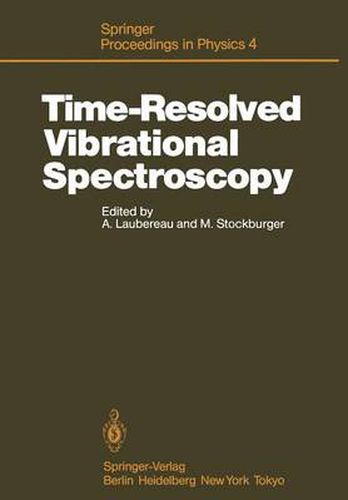Readings Newsletter
Become a Readings Member to make your shopping experience even easier.
Sign in or sign up for free!
You’re not far away from qualifying for FREE standard shipping within Australia
You’ve qualified for FREE standard shipping within Australia
The cart is loading…






This title is printed to order. This book may have been self-published. If so, we cannot guarantee the quality of the content. In the main most books will have gone through the editing process however some may not. We therefore suggest that you be aware of this before ordering this book. If in doubt check either the author or publisher’s details as we are unable to accept any returns unless they are faulty. Please contact us if you have any questions.
For more than two decades time-resolved vibrational spectroscopy (TRVS) was only part of general conferences on solid-state physics, molecular spec- troscopy, photochemistry and photobiology. It was in 1982 when the first meeting on TRVS was organized at Lake Placid. The conference met a strong need among the workers in the field, and it was decided to continue with spe- cial conferences on this topic. The 2nd International Conference on Time-Resolved Vibrational Spec- troscopy was held June 3-i, 1985 at Bayreuth-Bischofsgrun, Germany. Sci- entists from many disciplines came together to discuss their common interest in time-resolved techniques and spectroscopic applications. The high qual- ity of the research presented, the enthusiasm of the participants, and the attractive surroundings combined to an enjoyable atmosphere. Ample time for discussions and the limited number of participants (approximately 100) stimulated the formal and informal exchange of ideas. \‘umerous people helped to make the conference run smoothly. Special thanks are due to Mrs. Lenich for making the technical arrangements, and to the program committee for the selection of the scientific presentations. The meeting has benefited from several financial souces. The generous sup- port by the Emil-Warburg-Stiftung was particularly helpful. Financial aid of the Deutsche Forschungsgemeinschaft and of the Bayerisches Staatsmini- sterium fur U nterricht und K ultus is also gratefully acknowledged.
$9.00 standard shipping within Australia
FREE standard shipping within Australia for orders over $100.00
Express & International shipping calculated at checkout
This title is printed to order. This book may have been self-published. If so, we cannot guarantee the quality of the content. In the main most books will have gone through the editing process however some may not. We therefore suggest that you be aware of this before ordering this book. If in doubt check either the author or publisher’s details as we are unable to accept any returns unless they are faulty. Please contact us if you have any questions.
For more than two decades time-resolved vibrational spectroscopy (TRVS) was only part of general conferences on solid-state physics, molecular spec- troscopy, photochemistry and photobiology. It was in 1982 when the first meeting on TRVS was organized at Lake Placid. The conference met a strong need among the workers in the field, and it was decided to continue with spe- cial conferences on this topic. The 2nd International Conference on Time-Resolved Vibrational Spec- troscopy was held June 3-i, 1985 at Bayreuth-Bischofsgrun, Germany. Sci- entists from many disciplines came together to discuss their common interest in time-resolved techniques and spectroscopic applications. The high qual- ity of the research presented, the enthusiasm of the participants, and the attractive surroundings combined to an enjoyable atmosphere. Ample time for discussions and the limited number of participants (approximately 100) stimulated the formal and informal exchange of ideas. \‘umerous people helped to make the conference run smoothly. Special thanks are due to Mrs. Lenich for making the technical arrangements, and to the program committee for the selection of the scientific presentations. The meeting has benefited from several financial souces. The generous sup- port by the Emil-Warburg-Stiftung was particularly helpful. Financial aid of the Deutsche Forschungsgemeinschaft and of the Bayerisches Staatsmini- sterium fur U nterricht und K ultus is also gratefully acknowledged.